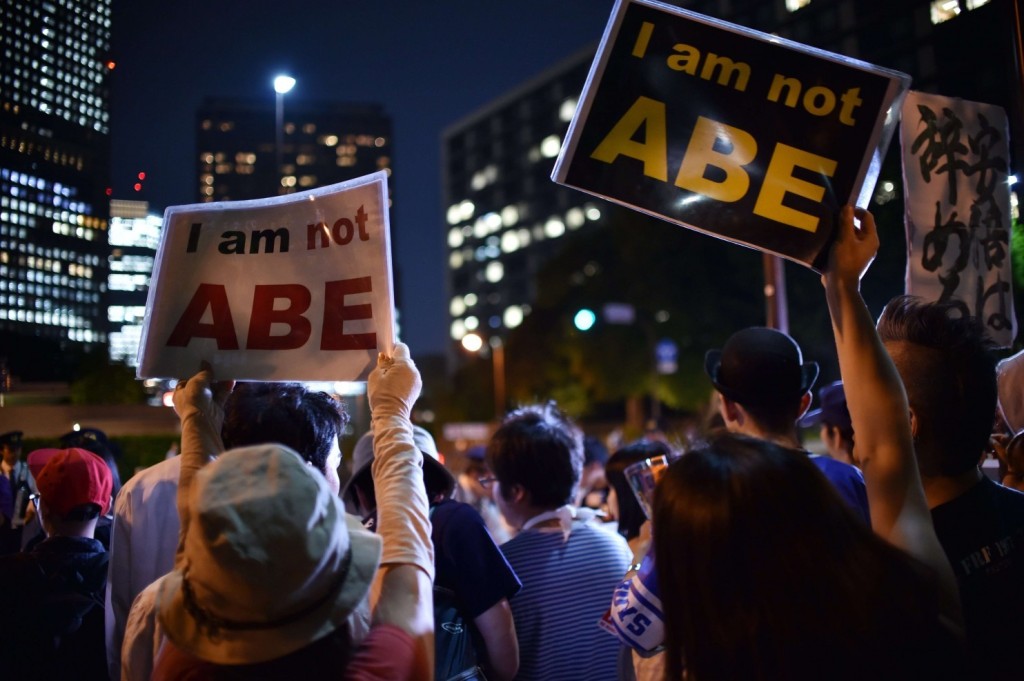Japan’s Cabinet Approves Bills to Loosen Post-War Military Restrictions
ASIA--PACIFIC, 18 May 2015
Anna Fifield – The Washington Post
Japan’s prime minister declared Thursday [14 May 2015] that his country would “never become entangled in a war being fought by the United States” as his cabinet approved legislation to loosen restrictions on Japan’s self-defense forces.

Protesters rally against the government of Japan’s Prime Minister Shinzo Abe in Tokyo on Thursday after Japan’s cabinet approved a set of bills bolstering the role and scope of the military. (Yoshikazu Tsuno/AFP/Getty Images)
Even as he vowed that the changes would make technically pacifist Japan more peaceful, Prime Minister Shinzo Abe also insisted that the changes would strengthen the country’s military alliance with the United States.
“I want to make clear that Japan will never become entangled in a war being fought by the United States,” Abe said at a news conference after the cabinet approved revisions to 10 security-related laws.
“We’ve been tying to strengthen the Japan-U.S. alliance, which is the center of our country’s security. The ties between Japan and the U.S. are much stronger than ever due to my recent visit to the U.S.,” Abe said, referring to new bilateral defense guidelines.
The revisions, which will be submitted Friday to the nation’s parliament, the Diet, would allow Japan’s self-defense forces to aid the United States if it came under attack. A strong debate is expected when deliberations begin later this month.
Under the American-written constitution imposed on the country after World War II, Japan has not been permitted to maintain a military and can act to defend itself only under a direct attack. The changes would give Japan a right of “collective self-defense” when it is placed in “apparent danger” as a result of an attack on the United States, Japan’s closest ally.
The second main change would allow Japan’s self-defense forces to be deployed overseas to support another army in combat, such as in Iraq or Afghanistan, although the government would still need the Diet’s approval every time before sending such forces abroad.
The cabinet began reinterpreting the constitution to allow the changes almost a year ago, but this week’s moves set the process in motion. The changes are highly controversial in Japan, where a majority of the population remains committed to a pacifist constitution. The revisions are considered a first step by Abe to try to amend the war-renouncing constitution if his ruling Liberal Democratic Party takes control of the upper chamber in elections next year.
Hundreds of people gathered outside the prime minister’s office Thursday to protest the changes, shouting, “Absolutely opposed to war bills” and “Don’t allow unilateral cabinet approval.”
One protester, Noriko Yoshino, a 58-year-old former teacher from Tokyo, said, “The government’s words sound like a deception because they call laws for war as ‘peace support’ measures,” according to the left-leaning Asahi newspaper.
Recent polls have found that about half of respondents either do not understand the legislative changes or oppose them.
In Washington, State Department spokesman Jeff Rathke said the legislation was a domestic matter for Japan, “but we certainly welcome Japan’s ongoing efforts to strengthen the alliance and to play a more active role in regional and international security activities.”
The changes are also highly controversial in South Korea and China, where critics fear they are part of a broader attempt by Abe, accused of being a revisionist and insufficiently repentant for Japan’s wartime aggression, to return the country to a more militaristic footing.
“We hope that Japan can earnestly learn the lessons of history, uphold the path of peaceful development . . . and play a constructive role in this Asian region,” Hua Chunying, spokeswoman for China’s foreign ministry, told reporters in Beijing, according to Reuters.
In Seoul, South Korean foreign ministry spokesman Noh Kwang-il said Japan must make changes to its defense policy “transparently.”
______________________________________
Read more:
Japan arrests son of unofficial North Korean envoy in mushroom case
Japan’s half-black Miss Universe says discrimination gives her ‘extra motivation’
The troubling history following Japan’s Shinzo Abe to Washington
In speech to Congress, Abe lays out more assertive role for Japan
Anna Fifield is The Post’s bureau chief in Tokyo, focusing on Japan and the Koreas. She previously reported for the Financial Times from Washington DC, Seoul, Sydney, London and from across the Middle East.
Go to Original – washingtonpost.com
DISCLAIMER: The statements, views and opinions expressed in pieces republished here are solely those of the authors and do not necessarily represent those of TMS. In accordance with title 17 U.S.C. section 107, this material is distributed without profit to those who have expressed a prior interest in receiving the included information for research and educational purposes. TMS has no affiliation whatsoever with the originator of this article nor is TMS endorsed or sponsored by the originator. “GO TO ORIGINAL” links are provided as a convenience to our readers and allow for verification of authenticity. However, as originating pages are often updated by their originating host sites, the versions posted may not match the versions our readers view when clicking the “GO TO ORIGINAL” links. This site contains copyrighted material the use of which has not always been specifically authorized by the copyright owner. We are making such material available in our efforts to advance understanding of environmental, political, human rights, economic, democracy, scientific, and social justice issues, etc. We believe this constitutes a ‘fair use’ of any such copyrighted material as provided for in section 107 of the US Copyright Law. In accordance with Title 17 U.S.C. Section 107, the material on this site is distributed without profit to those who have expressed a prior interest in receiving the included information for research and educational purposes. For more information go to: http://www.law.cornell.edu/uscode/17/107.shtml. If you wish to use copyrighted material from this site for purposes of your own that go beyond ‘fair use’, you must obtain permission from the copyright owner.